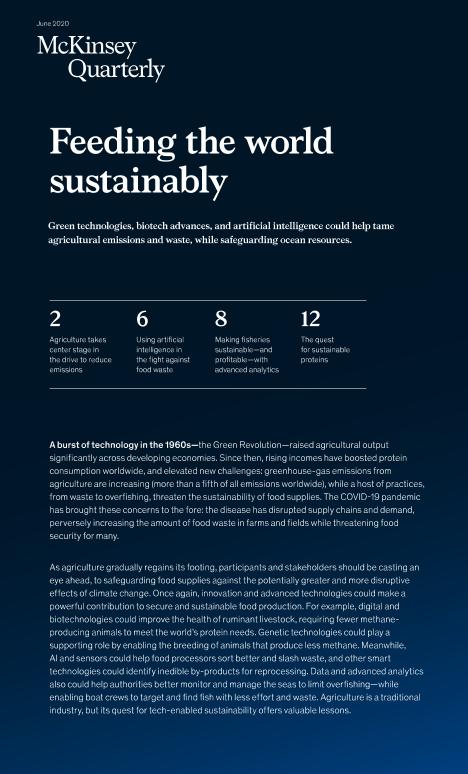Feeding the world sustainably

Contenido multimedia no disponible por derechos de autor o por acceso restringido. Contacte con la institución para más información.
| Tag | 1 | 2 | Valor |
|---|---|---|---|
| LDR | 00000cam a22000004b 4500 | ||
| 001 | MAP20200019336 | ||
| 003 | MAP | ||
| 005 | 20220911190826.0 | ||
| 008 | 180511e20200601usa|||| ||| ||eng d | ||
| 040 | $aMAP$bspa$dMAP | ||
| 084 | $a832.1 | ||
| 245 | 1 | 0 | $aFeeding the world sustainably |
| 260 | $aNew York$bMcKinsey & Company$c2020 | ||
| 300 | $a13 p. | ||
| 520 | $aA burst of technology in the 1960sthe Green Revolutionraised agricultural output significantly across developing economies. Since then, rising incomes have boosted protein consumption worldwide, and elevated new challenges: greenhouse-gas emissions from agriculture are increasing (more than a fifth of all emissions worldwide), while a host of practices, from waste to overfishing, threaten the sustainability of food supplies. The COVID-19 pandemic has brought these concerns to the fore: the disease has disrupted supply chains and demand, perversely increasing the amount of food waste in farms and fields while threatening food security for many. | ||
| 520 | $aAgriculture takes center stage in the drive to reduce emissions / Daniel Aminetzah, Joshua Katz, Peter Mannion -- Using artificial intelligence in the fight against food waste / Anna Granskog, Eric Hannon, Chirag Pandya -- Making fisheries sustainableand profitablewith advanced analytics / Julien Claes, Elin Sandnes, Antoine Stevens -- The quest for sustainable proteins / Jordan Bar Am, Zafer Dallal Bashi, Liane Ong | ||
| 650 | 4 | $0MAPA20200005599$aCOVID-19 | |
| 650 | 4 | $0MAPA20200005391$aCoronavirus | |
| 650 | 4 | $0MAPA20080552022$aPandemias | |
| 650 | 4 | $0MAPA20080557089$aAgricultura | |
| 650 | 4 | $0MAPA20080591113$aGases contaminantes | |
| 650 | 4 | $0MAPA20080587024$aProducción agraria | |
| 650 | 4 | $0MAPA20080584856$aEfecto invernadero | |
| 650 | 4 | $0MAPA20080570736$aSostenibilidad | |
| 650 | 4 | $0MAPA20080611200$aInteligencia artificial | |
| 700 | 1 | $0MAPA20200012399$aSternfels, Bob | |
| 700 | 1 | $0MAPA20200012405$aWilson, Matt | |
| 710 | 2 | $0MAPA20080442569$aMcKinsey & Company |

